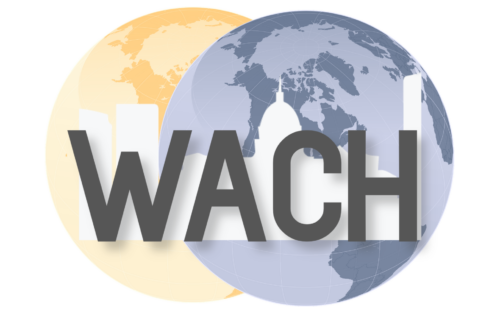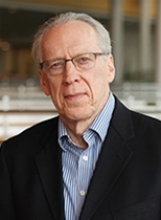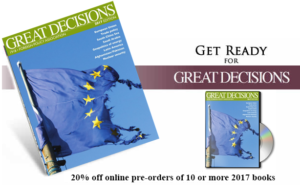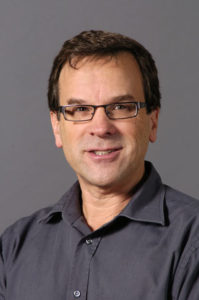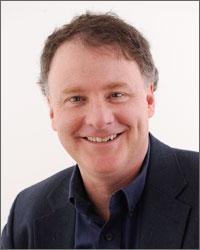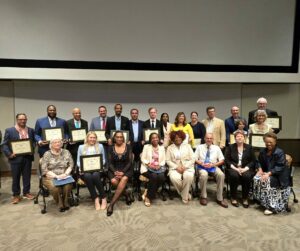World Affairs Council of Harrisburg discussions held bi-weekly each Monday at 1 p.m. beginning Feb. 4, 2019 through May 13, 2019 at the Cleve J. Fredricksen Library , 100 N 19th St, Camp Hill, PA 17011
Join us next year for Great Decisions 2020!
Cost of single WACH membership – $60
Join Now – HERE
Our 8 topics were:
- Refugees and Global Migration
- The Middle East: Regional Disorder
- Nuclear negotiations: Back to the Future?
- The Rise of Populism in Europe
- Decoding U.S.-China Trade
- Cyber Conflicts and Geopolitics
- The United States and Mexico: Partnership Tested
- State of the State Department and Diplomacy
Refugees and Global Migration
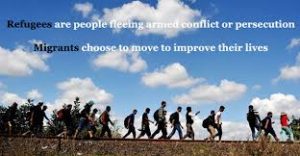
Today, no countries have open borders. Every state in today’s global system has its own laws and policies about who is permitted to cross its borders, and how they will do so. Who determines whether someone is a refugee or a migrant? How have different countries, including the United States, reacted to migration? How effective are the international laws, policies and organizations that have evolved to assist and protect refugees and migrants?
The Middle East: Regional Disorder
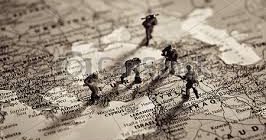 As the presidency of Donald J. Trump passes the halfway point, the Middle East remains a region in turmoil. The Trump administration has aligned itself with strongmen in Saudi Arabia, the United Arab Emirates and Egypt, which along with Israel have a common goal of frustrating Iranian expansion. What will be the fallout from policy reversals such as withdrawing from the Iranian nuclear accord and moving the U.S. embassy in Israel to Jerusalem? Does the United States see a path forward in troubled states such as Syria, Yemen, Libya and Iraq? Is the United States headed toward war with Iran?
As the presidency of Donald J. Trump passes the halfway point, the Middle East remains a region in turmoil. The Trump administration has aligned itself with strongmen in Saudi Arabia, the United Arab Emirates and Egypt, which along with Israel have a common goal of frustrating Iranian expansion. What will be the fallout from policy reversals such as withdrawing from the Iranian nuclear accord and moving the U.S. embassy in Israel to Jerusalem? Does the United States see a path forward in troubled states such as Syria, Yemen, Libya and Iraq? Is the United States headed toward war with Iran?
Nuclear Negotiations: Back to the Future?
Nuclear weapons have not gone away, and the Trump administration has brought a new urgency, if not a new approach, to dealing with them. The President has met with Vladimir Putin as the New Start Treaty with Russia comes up for renewal in 2021, the first presidential summit ever with Kim Jong-un occurred to discuss denuclearizing the Korean Peninsula, and President Trump has decertified the Obama nuclear deal with Iran. To what degree should past nuclear talks guide future U.S. nuclear arms control negotiations? Can the art of the deal apply to stabilizing our nuclear future?
The Rise of Populism in Europe
Mass migration, and the problems associated with it, have directly abetted the rise of populist parties in Europe. Opposition to immigration was the prime driver of support for Brexit, it brought a far-right party to the German Bundestag for the first time since the 1950s, and propelled Marine Le Pen to win a third of the vote in the French presidential election. In addition to calling for stronger borders, however, these parties are invariably illiberal, anti-American, anti-NATO and pro-Kremlin, making their rise a matter of serious concern for the national security interests of the United States.
Decoding U.S.-China Trade
Though arguably the most advanced economy in the world, the United States still uses centuries-old numbers to measure trade. These antique numbers mangle understanding of the U.S.-China trade relationship, shrinking America’s true economic size and competitiveness, while swelling China’s. Bad numbers give rise to bad policies that ultimately kill U.S. jobs and cede market share to China. What other tools can the United States employ to counter China’s unfair trade practices? There are several available, yet they remain mostly unused.
Cyber Conflict and Geopolitics
Cyber conflict is a new and continually developing threat, which can include foreign interference in elections, industrial sabotage and attacks on infrastructure. Russia has been accused of interfering in the 2016 presidential elections in the United States and China is highly committed to using cyberspace as a tool of national policy. Dealing with cyber conflict will require new ways of looking at 21st century warfare. Is the United States prepared to respond to such threats?
The United States and Mexico: Partnership Tested
By Michael Shifter and Bruno Binetti
The United States and Mexico have a long, intertwined history, with both countries prominently featured in each other’s politics and agendas. The war on drugs, immigration and trade issues have taxed the relationship over the years. What impact will new leadership in both countries have on this crucial partnership?
State of the State Department and Diplomacy
By Nicholas Burns
During the Trump administration, the usual ways of conducting diplomacy have been upended. Many positions in the State Department have never been filled, and meetings with foreign leaders such as Kim Jong-un and Vladimir Putin have been undertaken with little advance planning. What effect are these changes having now, and how will they affect ongoing relationships between the United States and its allies and adversaries?
SEE VIDEOS FROM LAST YEAR’S EVENT:
Topics for Great Decisions 2018 include:
The Waning of Pax Americana?
Discussant: Ambassador Dennis Jett
Ambassador Dennis Jett joined the School of International Affairs at Penn State University after a career in the U.S. Foreign Service that spanned twenty
His experience and expertise focus on international relations, foreign aid administration, and American foreign policy.
During the first months of Donald Trump’s presidency, the U.S. began a historic shift away from Pax Americana, the liberal international order that was established in the wake of World War II. Since 1945, Pax Americana has promised peaceful international relations and an open economy, buttressed by U.S. military power. In championing “America First” isolationism and protectionism, President Trump has shifted the political mood toward selective U.S. engagement, where foreign commitments are limited to areas of vital U.S. interest and economic nationalism is the order of the day. Geopolitical allies and challengers alike are paying close attention.
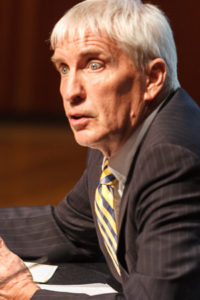
Russia’s Foreign Policy
Discussant: Dr. Craig Nation
Feb 19, 2018
R. Craig Nation is Professor of Strategy and Director of Russian and Eurasian Studies at the U.S. Army War College in Carlisle, PA. He specializes in security affairs with emphasis upon the European and Eurasian areas.
Under President Vladimir Putin, Russia is projecting an autocratic model of governance abroad and working to undermine the influence of liberal democracies, namely along Russia’s historical borderlands. Russia caused an international uproar in 2016, when it interfered in the U.S. presidential contest. But Putin’s foreign policy toolkit includes other instruments, from alliances with autocrats to proxy wars with the U.S. in Georgia, Ukraine and Syria. How does Putin conceive of national interests, and why do Russian citizens support him? How should the United States respond to Putin’s foreign policy ambitions?
China and America: the New Geopolitical Equation
Mar 5, 2018
 Discussant: Dr. David Lai
Discussant: Dr. David Lai
Dr. David Lai is a Research Professor of Asian Security Affairs at the Strategic Studies Institute of the U.S. Army War College. Before joining SSI, Dr. Lai was on the faculty of the U.S. Air War College. Born and raised in China, Lai witnessed China’s “Cultural Revolution,” its economic reform, and changes in China’s foreign relations.
In the last 15 years, China has implemented a wide-ranging strategy of economic outreach and expansion of all its national capacities, including military and diplomatic capacities. Where the United States has taken a step back from multilateral trade agreements and discarded the Trans-Pacific Partnership (TPP), China has made inroads through efforts like the Belt and Road Initiative and the Asian Infrastructure Investment Bank (AIIB). What are Beijing’s geopolitical objectives? What leadership and political conditions in each society underlie growing Sino-American tensions? What policies might Washington adopt to address this circumstance?
 Media and Foreign Policy
Media and Foreign Policy
Check out the You Tube video HERE
Discussant: Dr. Joyce M. Davis
Davis is an award-winning journalist and internationally acclaimed author who has lived and worked around the globe. She served as foreign editor for National Public Radio, Knight Ridder Newspapers and Associated Director of Broadcasting for Radio Free Europe/Radio Liberty, as well as Senior VP of Content for WITF. Davis is currently Director of Communications for the City of Harrisburg.
State and non-state actors today must maneuver a complex and rapidly evolving media landscape. Conventional journalism now competes with user-generated content. Official channels of communication can be circumvented through social media. Foreign policy is tweeted from the White House and “fake news” has entered the zeitgeist. Cyberwarfare, hacking and misinformation pose complex security threats. How are actors using media to pursue and defend their interests in the international arena? What are the implications for U.S. policy?
Turkey: A Partner in Crisis
April 2, 2018
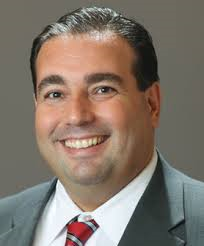
Sait Onal is President of the Turkish Cultural Association of Pennsylvania and a member of the board of directors of the World Affairs Council of Harrisburg. He is knowledgeable on Turkish affairs and has spearheaded WACH travel from our region to Turkey. Onal has helped organize annual Turkish Culture days at the state Capitol and led the Council’s International speaker series, sending speakers to talk about developments in Turkey to World Affairs Councils throughout the country.
Of all NATO allies, Turkey represents the most daunting challenge for the Trump administration. In the wake of a failed military coup in July 2016, the autocratic trend in Ankara took a turn for the worse. One year on, an overwhelming majority of the population considers the United States to be their country’s greatest security threat. In this age of a worsening “clash of civilizations” between Islam and the West, even more important than its place on the map is what Turkey symbolically represents as the most institutionally Westernized Muslim country in the world.
U.S. Global Engagement and the Military
Apr 16, 2018 1:00p.m.-2:30p.m.
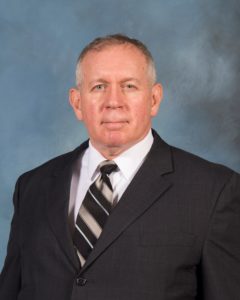
Dr. G. K. Cunningham is Professor of Joint Landpower at the U.S. Army War College, Carlisle Barracks, PA. Dr. Cunningham has served on the faculty at U.S. Army War College since 2001 as a faculty subject matter expert on joint landpower, theater planning, and expeditionary warfare. He has an extensive background in both amphibious and land operations as a commander and staff officer in Marine Corps and joint commands, worldwide. His area of expertise is organizational management and leadership in stratified systems
The global power balance is rapidly evolving, leaving the United States at a turning point with respect to its level of engagement and the role of its military. Some argue for an “America First” paradigm, with a large military to ensure security, while others call for a more assertive posture overseas. Some advocate for a restoration of American multilateral leadership and a strengthened role for diplomacy. Still others envision a restrained U.S. role, involving a more limited military. How does the military function in today’s international order, and how might it be balanced with diplomatic and foreign assistance capabilities?
South Africa’s Fragile Democracy
Apr 30, 2018 1:00p.m.-2:30p.m.
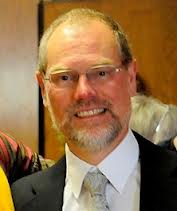
Jon Rudy is Peacemaker in Resident at Elizabethtown College’s Center for Global Understanding and Peacemaking, as well as professor of Peace and Conflict Studies.With more than more than thirty years of working and learning in 30 countries in Asia and Africa, Rudy has focused his efforts on peacebuilding and conflict transformation at grass roots community and middle-out leadership levels. Rudy has worked in peacebuilding operations in Asian and African, including in South Africa. Dr.
The African National Congress (ANC) party has governed South Africa since the end of apartheid in 1994. But the party today suffers from popular frustration over official corruption and economic stagnation. It faces growing threats from both left and right opposition parties, even as intraparty divisions surface. Given America’s history of opportunistic engagement with Africa, there are few prospects for a closer relationship between the two countries. Meanwhile, a weaker ANC could lead to political fragmentation in this relatively new democracy.
Global health: Progress and Challenges
Dr. Mehdi Noorbaksh is vice president of the World Affairs Council of Harrisburg and an internationally acknowledged expert on global health issues. He is International Affairs and Business professor at Harrisburg University and lectures around the world on global issues.
The collective action of countries, communities and organizations over the last 30 years has literally saved millions of lives around the world. Yet terrible inequalities in health and well-being persist. The world now faces a mix of old and new health challenges, including the preventable deaths of mothers and children, continuing epidemics of infectious diseases, and rising rates of chronic disease. We also remain vulnerable to the emergence of new and deadly pandemics. For these reasons, the next several decades will be just as important—if not more so—than the last in determining well-being across nations.
****************************
GREAT DECISIONS 2017 TOPICS 
The Future of Europe: Coping With Crisis – 1 p.m. Monday – Feb. 6, 2017
-
 Speaker: Dr. Juliette Tolay, Assistant Professor of Political Science at the School of Public Affairs in Penn State Harrisburg
Speaker: Dr. Juliette Tolay, Assistant Professor of Political Science at the School of Public Affairs in Penn State Harrisburg -
Moderator: Dr. Joyce M. Davis, President/CEO, World Affairs Council of Harrisburg
The European Union is under severe strain. British voters have chosen to leave the EU while the Eurozone debt crisis and the influx of migrants pose an existential threat to the political and economic bloc. Can the EU withstand the pressure?
Trade, Jobs and Politics -1 p.m. Monday – Feb. 20, 2017
Speaker:
China’s and the South China Sea – 1 p.m. Monday – March 6
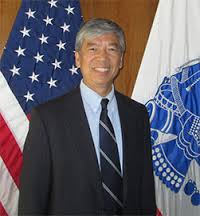 College (USAWC), and expert on U.S.-China relations
College (USAWC), and expert on U.S.-China relations Moderator: Dr. Mehdi Noorbaksh, Harrisburg University
 Saudi Arabia – 1 p.m. Monday – March 20
Saudi Arabia – 1 p.m. Monday – March 20
Speaker: Dr. David Commins, Professor, Dickinson College
Moderator: Dr. Mehdi Noorbaksh, Harrisburg University
The Geopolitics of Oil -1 p.m. Monday – April 3
Speaker: Dr. Lane Schultz, founder and the Senior Vice President for Geosciences of Endless Mountain Energy
Moderator: Dr. Chris Dolan, Lebanon Valley College
After decades of relative stability, the U.S. energy revolution is beginning to shift the dynamics of the energy market. Once dependent on the Middle East for much of its energy, the U.S. is now producing more of its own—potentially freeing America to pursue a new foreign policy in the region.
Latin America -1 p.m. Monday -April 17
Speaker:
Dr. R. Evan Ellis, research professor of Latin American Studies at the Strategic Studies Institute, U.S. Army War College
- Moderator: Wayne Selcher, Elizabethtown College Center for Global Understanding and Peacemaking
Prospects for Pakistan and Afghanistan – 1 p.m. Monday – May 1
Speaker:
Michael Kugelman is the Senior Associate for South Asia and Deputy Director, Asia Program, Wilson Center in Washington, D.C.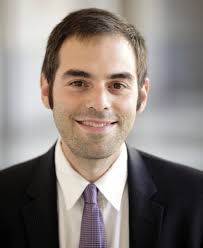
U.S. troops have been in Afghanistan for over 15 years—making it the longest war in American history. As Washington and NATO pivot away from Afghanistan by reducing troop numbers, the ability of the government and security forces to maintain stability will be tested.
Nuclear Security – 1 p.m. Monday – May 15
-
Speaker:
The nuclear status quo is changing. Nine nations are declared nuclear powers—and non-state actors are upending cold war era strategy. How can leaders stop countries from acquiring nuclear weapons, keep nuclear materials out of the hands of non-state actors and protect nuclear facilities from potential terrorist attacks?
